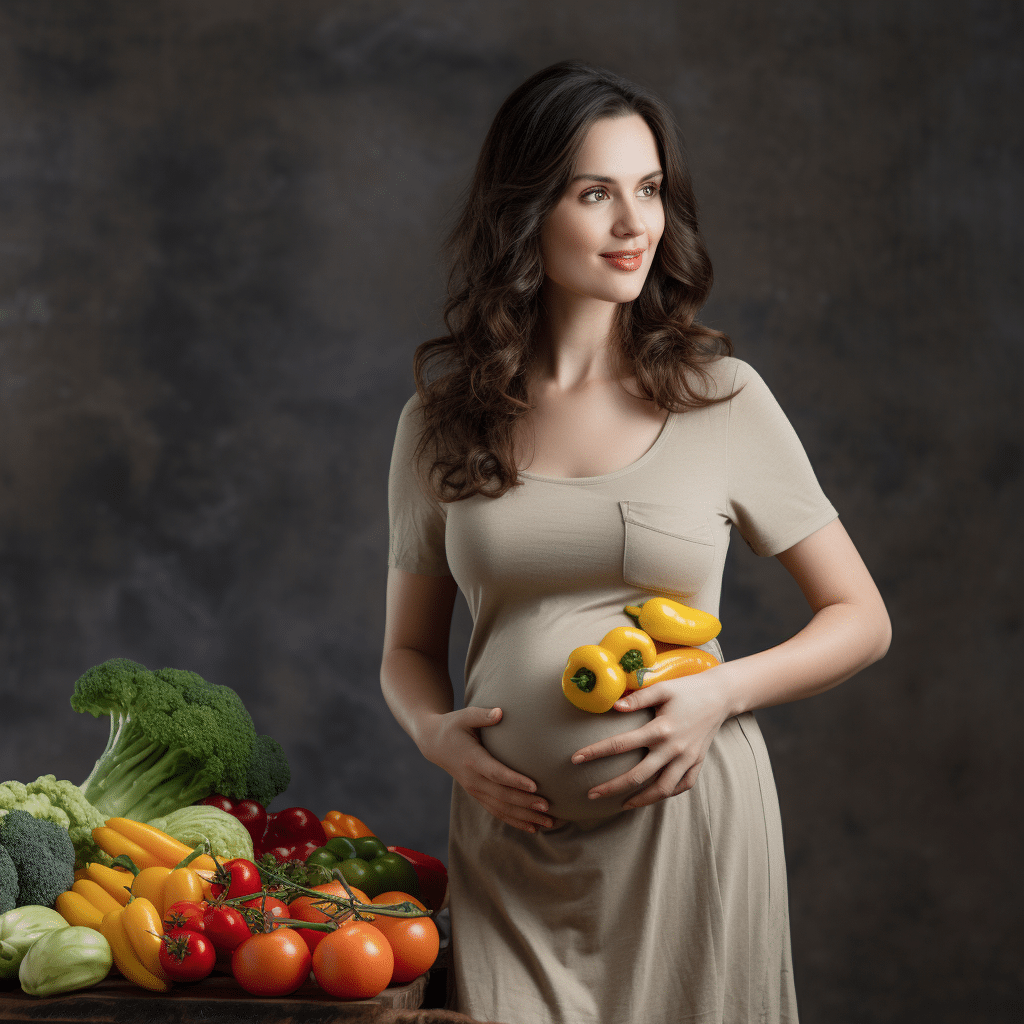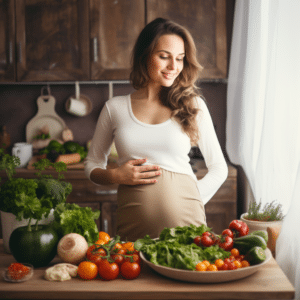
Essential Nutrition During Late Pregnancy: Vital Guidelines
Late pregnancy nutrition a woman is pregnant, her body goes through major changes to help the baby grow and develop. It’s essential to pay attention to her nutritional needs during this time.
Late pregnancy is from 28 weeks onwards. At this point, the baby is gaining weight and needs more of the mother’s energy. A balanced diet with all the necessary nutrients must be consumed to support both the mother and baby. This helps prevent complications like preterm birth and low birth weight.
Iron is essential during late pregnancy. It makes red blood cells and prevents anemia in both. Plus, it transports oxygen and helps with growth and development. Foods like lean meats, beans, lentils, fortified cereals, and spinach are good sources.
Calcium is important too. It helps build strong bones and teeth for both. Plus, it takes care of nerves, muscles, and hormones. Dairy products, leafy greens, tofu, almonds, and fortified milk alternatives have lots of calcium.
Omega-3 fatty acids are necessary for the baby’s brain development. They support cognitive functions and neurologic health. Fatty fish, walnuts, flaxseeds, chia seeds, and fortified eggs are full of these healthy fats.
Importance of Meeting Nutritional Needs During Late Pregnancy

Late pregnancy is a time when nutrition is particularly important for expectant mothers. Eating a balanced, nutrient-rich diet is crucial for both the mother and baby. Adequate vitamins, minerals, and macronutrients support optimal growth and development. Plus, they reduce risks during delivery and enhance maternal well-being.
To meet these nutritional needs, pregnant women should focus on consuming a variety of foods. This includes increasing their protein intake from sources like lean meats, poultry, fish, legumes, and dairy products. These proteins are vital for forming fetal tissues and organs.
Fruits and vegetables should also be incorporated into meals. They are packed with essential vitamins and minerals. For example, folate-rich foods like leafy greens, citrus fruits, and fortified cereals can help prevent neural tube defects in babies. Vitamin C from fruits helps with iron absorption from plant-based sources like beans or spinach.
My friend is an example of how important it is to meet nutritional needs during late pregnancy. She was very careful to eat a balanced diet in her last trimester. As a result, she had lots of energy throughout her pregnancy. Plus, she gave birth to a healthy baby girl without any issues. This emphasizes the significance of proper nutrition for a successful pregnancy outcome.
Recommended Daily Calorie Intake for Pregnant Women
Pregnant women need a certain amount of calories each day for themselves and their baby. This depends on things such as weight, height, age, and activity level. Let’s look into how many calories pregnant women should have.
| Trimester | Calories per Day |
| First Trimester | 1800-2200 |
| Second Trimester | 2200-2500 |
| Third Trimester | 2400-2900 |
First trimester? 1800-2200 calories. This is because the mother needs more energy to support the fetus’s growth. Second trimester? 2200-2500 calories. This is to support the baby’s rapid growth. Third trimester? 2400-2900 calories. This is to give enough energy to mom and baby.
Focus on nutrient-dense foods like fruits, veggies, whole grains, lean proteins, and healthy fats. These provide vitamins, minerals, and macronutrients for growth. And don’t forget to drink plenty of water!
Listen to your body’s hunger cues and eat when you’re hungry. Snack on things like nuts, seeds, yogurt, and fresh fruit to keep energy levels up.
Essential Nutrients for Pregnant Women
During Late pregnancy nutrition, it is important for expectant mothers to fulfill their nutrient requirements. This supports their health and the development of their baby. Nutrients are key for a healthy pregnancy and the well-being of both. Let’s take a look at the important ones.
Iron: Necessary for hemoglobin production to prevent anemia. Sources: Lean red meat, poultry, fish, legumes.
Calcium: For strong bones and teeth. Sources: Milk, cheese, yogurt, fortified plant-based milk.
Folic Acid (Folate): Essential for fetal development and avoiding neural tube defects. Sources: Leafy green vegetables, citrus fruits, beans.
Protein: For tissue growth and repair, enzymes, hormones. Sources: Lean meats, poultry, fish, eggs.
Omega-3 Fatty Acids: For fetal brain development, reducing preterm labor risk. Sources: Fatty fish (salmon), chia seeds, walnuts.
Vitamin D is needed for calcium absorption plus bone health. Sources: Sunlight exposure, fortified milk, fatty fish. Zinc is essential for immune function and cell division. Sources: Lean meats, nuts, whole grains.
We must not forget nutrition during late pregnancy. It’s vital for both mother and child. A well-balanced diet or prenatal supplements will give the baby the best start in life. Proactive steps are necessary – consult healthcare professionals, include nutrient-rich foods in meals. Every bite matters for you and your baby.
Foods to Include in the Diet
During late pregnancy, it’s important for women to get the nutrition they need. Eating fruits, veggies, whole grains, lean proteins and more can help both the mom and baby.
– Fruits and veggies: Add a variety of these colorful foods to your meals. They’re packed with vitamins, minerals and antioxidants to boost immunity and promote healthy growth.
– Whole Grains: Choose whole grain breads, cereals and pastas. Fiber helps digestion and prevents constipation.
– Lean Proteins: Poultry, fish, beans and tofu are great sources of protein for baby’s muscles and organs.
Plus, healthy fats like avocados, nuts, and seeds are good for baby brain development. Dairy products like milk, cheese and yogurt have calcium and protein. Iron-rich foods such as lean meats, legumes, dried fruits and fortified cereals help create red blood cells and prevent anemia.
Eating the right foods during late pregnancy helps both you and your baby stay healthy. Talk to your healthcare provider for personalized advice.
Foods to Avoid or Limit During Late Pregnancy
During the final stages of pregnancy, it’s vital that women be aware of their food choices. Some foods should be avoided or limited to ensure safety for both mom and baby.
Raw or undercooked seafood like sushi or oysters is a no-go as it contains bacteria and parasites. Unpasteurized dairy products such as feta or blue cheese also contain listeria bacteria, which can cause listeriosis and lead to complications.
High-mercury fish like shark, swordfish, king mackerel, and tilefish should be avoided too. It’s best to choose low-mercury alternatives like salmon or trout.
Maintaining a balanced diet with varied nutritious foods is a must for pregnant women – this will help avoid any potential risks that may come from certain foods.
Nutrition is key to promoting healthy fetal growth and development during late pregnancy, according to a study published in the Nutrition Reviews journal.
Meal Ideas for Pregnant Women
It’s essential to have a healthy, balanced diet while pregnant. Here’s some yummy meal ideas that provide the needed nutrients!
| Meal | Food |
|---|---|
| Breakfast | Oatmeal |
| Yogurt | |
| Lunch | Spinach |
| Salad | |
| Snack | Carrot |
| Sticks | |
| Dinner | Grilled |
| Chicken |
Apart from these, lean meats, fruits, veggies, whole grains, and dairy products with calcium are also necessary. These foods help maintain a healthy weight and give essential vitamins and minerals for late pregnancy.
Pro Tip: For the perfect nutrition, talk to a registered dietitian who focuses on prenatal nutrition.
Hydration and Fluid Intake
Pregnant women must keep their hydration levels up! Water should be consumed regularly – 8-10 cups (64-80 ounces) a day.
Herbal teas, milk, fruit juices and soups are other options. This’ll help fight off common problems like constipation, leg cramps and urinary tract infections.
Maria, an expectant mum, recently spoke about her late pregnancy experience. She stressed the need to stay hydrated to avoid fatigue and dizziness.
So, Maria kept a bottle of water with her at all times and felt much better. Hydration is key for pregnant women!
Common Nutritional Concerns During Late Pregnancy

Late pregnancy nutrition brings many nutritional concerns. Women should take extra care to ensure adequate intake of essential nutrients, manage weight gain, stay hydrated, and eat a balanced diet.
- Essential Nutrients: Folic acid, iron, calcium, and omega-3 fatty acids are necessary. They aid fetal development and prevent deficiencies.
- Weight Gain: Normal weight gain is okay. Too much is not. Exercise and portion control can help.
- Hydration: Eight cups of water per day is necessary. Dehydration can cause complications.
- Balanced Diet: Fruits, veggies, whole grains, lean proteins, and dairy are important. Avoid processed food with sugar and fat.
Smaller meals throughout the day instead of three large ones can help with digestion and heartburn. Healthcare providers may suggest additional supplements or adjustments to meet individual needs.
To sum it up: Essential nutrients, weight management, hydration, and a balanced diet are essential during late pregnancy. Consulting with healthcare providers can tailor recommendations to individual needs.
Conclusion
Pregnant women later in their term have special dietary needs. It’s important to get enough iron, calcium, and folate for both mother and baby. It’s also key to stay hydrated and consume enough calories.
Focus on nutrient-rich food like fruits, veggies, whole grains, lean proteins, and dairy. These have essential vitamins and minerals that help the baby grow. Avoid high-sugar and processed foods with little nutritional value.
Regular check-ups with healthcare professionals help monitor the mother and baby’s health. This ensures nutrient deficiencies or complications can be identified early and addressed. Taking supplements as advised by your healthcare provider can help meet specific needs during this important stage.
Frequently Asked Questions
1. What are the nutritional needs of pregnant women during late pregnancy?
During late pregnancy, the nutritional needs of pregnant women increase to support the growth and development of the baby. They require extra calories, protein, vitamins, and minerals to ensure a healthy pregnancy.
2. How many extra calories should pregnant women consume during late pregnancy?
Pregnant women in late pregnancy should consume an additional 300-500 calories per day to meet the energy requirements of both themselves and the growing baby.
3. What are the important nutrients pregnant women should focus on during late pregnancy?
Pregnant women in late pregnancy should emphasize getting enough iron, calcium, vitamin D, folate, omega-3 fatty acids, and protein. These nutrients are crucial for the baby’s development and the mother’s health.
4. Are there any specific foods pregnant women should avoid during late pregnancy?
During late pregnancy, pregnant women should avoid certain foods that may pose a risk to the baby’s health, such as unpasteurized dairy products, deli meats, raw seafood, and excess caffeine. It is advisable to consult with a healthcare provider for a comprehensive list.
5. Is it necessary to take supplements during late pregnancy?
In addition to a healthy diet, pregnant women may need to take prenatal supplements recommended by their healthcare provider. These supplements help ensure adequate intake of essential nutrients like folic acid, iron, and omega-3 fatty acids.
6. How much water should pregnant women drink during late pregnancy?
Pregnant women should drink plenty of water during late pregnancy to stay hydrated. The recommended daily intake is around 8-10 cups (64-80 ounces) of water. However, individual water needs may vary depending on factors like climate and physical activity levels.